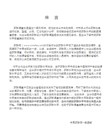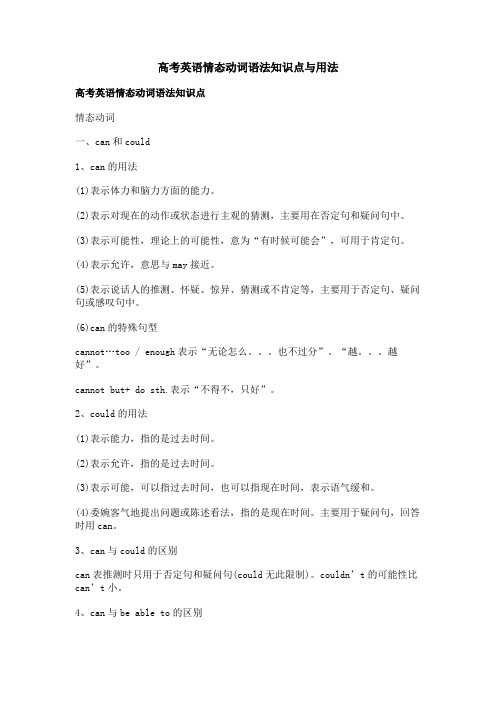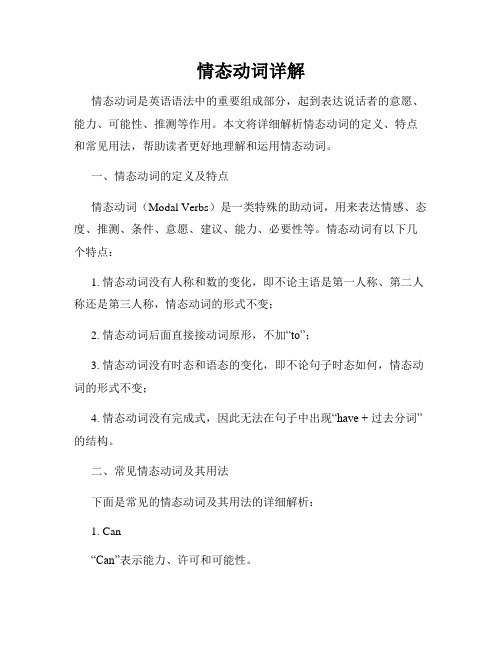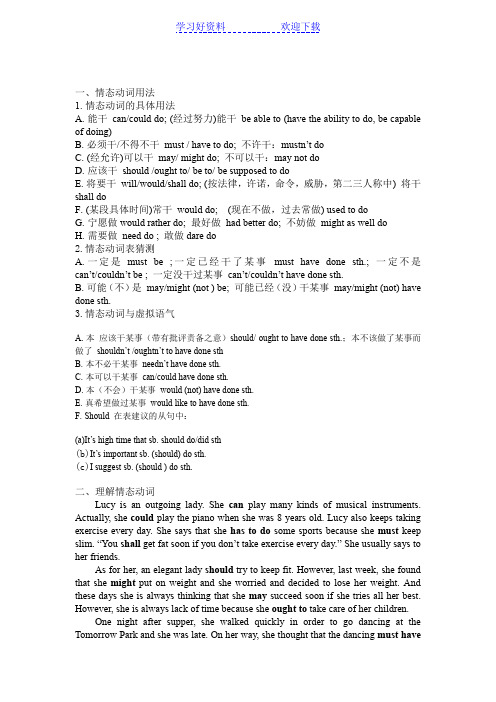高中英语情态动词讲解
高中英语语法讲义-情态动词

He may [might] be writing a letter. 他可能在写信。
They may [might] be going abroad next month. 他们可能在下个月出国。
③ 后接动词完成式,表示对过去可能发生的事进行推测:
另外,could还可与表示感知的动词(如see, hear, smell, taste, feel, understand等)连用表示的特定能力:
Looking down from the plane, we could see lights on the runway. 从飞机上向下看,我们可以看见机场跑道上的点点灯火。
2) 表示委婉的批评或责备:
You might have made greater progress. 你的进步本来可更大一些的。
You might at least have answered my letter. 你至少可以回我一封信嘛。
③ 表示“差点儿就要”:
I could have died laughing. 我差点儿笑死了。
二、may与might的用法
1. 表示允许
注意以下两种情况:
(1) 表示请求允许(即请求别人允许自己做某事),两者都可用,只是 might 表示的语气较委婉(但并不表示过去):
May [Might] I sit here? 我可以坐在这里吗?
1) 表示过去某事可能发生而实际上却并没发生:
A lot of men died who might have been saved.很多人本来可以获救的却死了。
It was really very dangerous. I might have killed myself. 那真的是太危险了,我差点没命了。
高中英语语法系统讲解之八情态动词和虚拟语气

高中英语语法系统讲解之八情态动词和虚拟语气情态动词一. 情态动词的类型和特征1. 类型○1只作情态动词用的有:can(could),may(might),must,ought to。
○2可作情态动词也作实义动词的有:need,dare。
○3可作情态动词也作助动词的有:shall(should),will(would)。
○4具有情态动词某些特征的有:have(had)to,used to。
2. 特征情态动词有一定的词义,但不能单独作谓语,须和实义动词或系动词连用,构成谓语;且适用于主语的各种人称和数(have to例外),主语是第三人称单数时,要用has to。
二. 情态动词的基本用法1. can与could○1表示能力或客观可能性,还可表示请求和允许,她存在以下几种形式:如Children can be troublesome sometimes.○2表示惊异、推测、怀疑、不相信的态度(主要用于否定句、疑问句中)。
如This can’t be done by him.○3can的习惯用法A. can but的用法can but“只好,至多不过”,如We can but do our best.B. cannot help but,cannot help的用法二者都表示“不得不;不能避免;不禁”;但前者后加动词原形,后者加代词或动名词等。
如The girl couldn’t help but live on herself.When I try to speak, I can’t help making mistakes.C. cannot … too“无论怎样……都不过分;越……越好”如We can’t thank you too much for what you have done for us。
We can not be too careful to cross the road.温馨提示:○1can与be able to:can表示有能力做某事,be able to表示通过努力、克服困难做成某事。
高考英语情态动词语法知识点与用法

高考英语情态动词语法知识点与用法高考英语情态动词语法知识点情态动词一、can和could1、can的用法(1)表示体力和脑力方面的能力。
(2)表示对现在的动作或状态进行主观的猜测,主要用在否定句和疑问句中。
(3)表示可能性,理论上的可能性,意为“有时候可能会”,可用于肯定句。
(4)表示允许,意思与may接近。
(5)表示说话人的推测、怀疑、惊异、猜测或不肯定等,主要用于否定句、疑问句或感叹句中。
(6)can的特殊句型cannot…too / enough表示“无论怎么。
也不过分”。
“越。
越好”。
cannot but+ do sth.表示“不得不,只好”。
2、could的用法(1)表示能力,指的是过去时间。
(2)表示允许,指的是过去时间。
(3)表示可能,可以指过去时间,也可以指现在时间,表示语气缓和。
(4)委婉客气地提出问题或陈述看法,指的是现在时间。
主要用于疑问句,回答时用can。
3、can与could的区别can表推测时只用于否定句和疑问句(could无此限制)。
couldn’t的可能性比can’t小。
4、can与be able to的区别(1)现在时:无区别,但后者不常用。
(2)完成时;can没有完成时,此时要用have(has,had)been able to。
(3)将来时:can没有将来时,要用will be able to。
(4)过去时:could表示一般能力,was/were able to 表示在具体场合通过努力成功做成某事的能力。
二、may 和might1、may的用法(1)表示询问或说明一件事可不可以做。
(2)表示一件事或许会发生或某种情况可能会存在,通常用在肯定句和否定句中。
注意:表示可能性时,can’t语气强,表示“不可能”,may not语气弱,表示“可能不”。
2、might的用法(1)表示询问或允许,指的是过去时间。
(2)表示可能发生的事,可以指过去时间,也可以指现在时间,语气更加不肯定,可能性比may小一些。
情态动词详解

情态动词详解情态动词是英语语法中的重要组成部分,起到表达说话者的意愿、能力、可能性、推测等作用。
本文将详细解析情态动词的定义、特点和常见用法,帮助读者更好地理解和运用情态动词。
一、情态动词的定义及特点情态动词(Modal Verbs)是一类特殊的助动词,用来表达情感、态度、推测、条件、意愿、建议、能力、必要性等。
情态动词有以下几个特点:1. 情态动词没有人称和数的变化,即不论主语是第一人称、第二人称还是第三人称,情态动词的形式不变;2. 情态动词后面直接接动词原形,不加“to”;3. 情态动词没有时态和语态的变化,即不论句子时态如何,情态动词的形式不变;4. 情态动词没有完成式,因此无法在句子中出现“have + 过去分词”的结构。
二、常见情态动词及其用法下面是常见的情态动词及其用法的详细解析:1. Can“Can”表示能力、许可和可能性。
能力:用于表达某人在某方面具有的能力或技能。
例句:He can speak three languages.许可:用于征求或给予许可。
例句:Can I borrow your pen, please?可能性:用于表达可能发生的情况。
例句:It can rain tomorrow.2. Could“Could”是Can的过去式,表示过去或虚拟条件下的能力、许可和可能性。
能力(过去):用于表达过去具备的能力或技能。
例句:When I was young, I could run very fast.许可(过去):用于过去征求或给予许可。
例句:Could I use your phone yesterday?可能性(虚拟条件):用于表示虚拟情况下的可能性。
例句:If I had enough money, I could travel around the world.3. May“May”表示允许、可能性、祝愿和推测。
允许:用于征求或给予许可。
例句:May I come in?可能性:用于表达主观推测的可能性。
高中英语情态动词讲解

一、情态动词用法1.情态动词的具体用法A.能干can/could do; (经过努力)能干be able to (have the ability to do, be capable of doing)B.必须干/不得不干must / have to do; 不许干:mustn’t doC.(经允许)可以干may/ might do; 不可以干:may not doD.应该干should /ought to/ be to/ be supposed to doE.将要干will/would/shall do; (按法律,许诺,命令,威胁,第二三人称中) 将干shall doF.(某段具体时间)常干would do; (现在不做,过去常做) used to doG.宁愿做would rather do; 最好做had better do; 不妨做might as well doH.需要做need do ; 敢做dare do2.情态动词表猜测A.一定是must be ;一定已经干了某事must have done sth.; 一定不是can’t/couldn’t be ; 一定没干过某事can’t/couldn’t have done sth.B.可能(不)是may/might (not ) be; 可能已经(没)干某事may/might (not) have done sth.3.情态动词与虚拟语气A.本应该干某事(带有批评责备之意)should/ ought to have done sth.;本不该做了某事而做了shouldn’t /oughtn’t to have done sthB.本不必干某事needn’t have done sth.C.本可以干某事can/could have done sth.D.本(不会)干某事would (not) have done sth.E.真希望做过某事would like to have done sth.F.Should 在表建议的从句中:(a)It’s high time that sb. should do/did sth(b)It’s important sb. (should) do sth.(c)I suggest sb. (should ) do sth.二、理解情态动词Lucy is an outgoing lady. She can play many kinds of musical instruments. Actually, she could play the piano when she was 8 years old. Lucy also keeps taking exercise every day. She says that she has to do some sports because she must keep slim. “You shall get fat soon if you don’t take exercise every day.” She usually says to her friends.As for her, an elegant lady should try to keep fit. However, last week, she found that she might put on weight and she worried and decided to lose her weight. And these days she is always thinking that she may succeed soon if she tries all her best. However, she is always lack of time because she ought to take care of her children.One night after supper, she walked quickly in order to go dancing at the Tomorrow Park and she was late. On her way, she thought that the dancing must havebegun, and the coach could have taught or shown many new moves. She was afraid that her friends might have left before she got there. She was regretful then. She should have had supper earlier, or she could have taken a taxi, and indeed she needn’t have taken a bath in advance. When she reached the park finally, she found nobody was there. She remembered suddenly that it had been reported on the radio that there would be a heavy rain that night.思考每个加黑的情态动词的含义;什么时候用情态动词的完成式,分别表达什么意思。
高中英语语法讲解: 情态动词

高中英语语法讲解:情态动词概述1.共有10个情态动词:can/could, may/might, will/would, shall, should, ought to, must;2个半情态动词need, dare2.特点:(1)情态动词后加动词原形(即不带to的不定式)一起构成谓语;(2)没有人称和数的变化;(3)多数情态动词有过去式,但其过去式有时并不表示时态,而只起“委婉或不确定语气”的作用。
Would you do me a favour? She may/might be watering the flowers now.3.情态动词在句子中可发挥不同作用,如表能力,表责任与义务,表推测,表征求允许,表请求,表建议,表语气态度等等He can/could run 100 meters in 11 seconds.You should/ought to/must work hard to win a gold medal.Can/Could/May/Might I watch the Olympics tonight?Will/Can/Could/Would you help me with my training?He might/may/could/should/ought to/will/must watch the football match tonight.I suggest that you should watch the opening ceremony.Can this be true?4.情态动词+do 表对一般现在或将来情况的推测情态动词+ be doing 表对正在发生的事情的推测情态动词+have done 表对过去已经发生的事情的推测一、can/could 的用法1.表能力(1) can do现在一般的能力(2) could do过去一般的能力(3) could have done过去有能力做但没做具体某事(4)was/were able to do = managed to do/ succeeded in doing 过去有能力做且做了具体某事。
高中英语情态动词详解
高中英语情态动词详解以下是分享给各位考生的高中英语情态动词详解,欢送浏览。
一般说来,"进展式"表示动作正在发生或进展;"完成式"那么表示动作是发生在过去或是表示按理是发生了但事实上却没有发生。
下面我们分别讨论一下各种详细情况。
A. 关于情态动词后面接进展式的情况can后面接进展式表示可能正在发生的动作,例如:What can she be doing at this moment ? 这个时候她会在做什么呢?You can't be telling us the truth.你不可能在对我将真话。
Can he be still thinking of it I told him ?他会不会还在考虑我告诉他的那件事呢?may后面接进展式表示可能正在发生的动作,例如:Your mother may be waiting for you to return home .你妈妈可能正等着你回家吧。
She may be leaving for New York tomorrow or some day .她或许明天或者什么时候会动身去纽约。
They may be returning back before Christmas .他可能圣诞节前回来。
might后面接进展式表示可能正在发生的动作,例如:They might be planning to make a loan for their new project .他们也许在为他们的新工程筹划贷款的事。
She might still be crying for being wronged .她或许因为受了冤枉还在啼哭。
You might be telling me a lie .你也许在对我撒谎。
must后面接进展式表示想必正在做某事,例如:You must be thinking where I learned it .你一定在想我是从哪儿知道这件事的。
情态动词知识点总结高中
情态动词知识点总结高中情态动词是英语中一个重要的语法现象,它们能够表达说话者的情感、态度、意愿等,以及表达说话者对事件的推测、猜测、可能性等。
了解情态动词的用法,能够帮助我们更准确地表达自己的意思,也有助于我们理解他人的意图。
本文将对情态动词的概念、用法、以及常见的情态动词进行总结和归纳,以便于读者更深入地理解情态动词的使用。
一、情态动词的概念情态动词(Modal Verb)是一类特殊的助动词,用来表示说话者的情感、态度、意愿等,以及表达说话者对事件的推测、猜测、可能性等。
情态动词通常用于句子的前面,后面跟动词原形,用来构成不同的语法结构和表达不同的含义。
英语中常见的情态动词有can、could、may、might、must、shall、should、will、would、ought to等。
这些情态动词具有一些共同的特点,比如不能独立完成谓语,后面必须跟动词原形;在疑问句和否定句中,情态动词的位置要发生变化等。
二、情态动词的用法1. 表示能力和可能性can与could表示说话者的能力或者对某种事情的可能性,其中can用于现在时,could用于过去时。
比如:I can speak Spanish.(我会说西班牙语。
)She could swim when she was five.(她五岁的时候就会游泳。
)may与might也表示可能性,may 用于现在时,might 用于过去时。
比如:It may rain tomorrow.(明天可能会下雨。
)I thought she might come.(我以为她可能会来。
)2. 表示请求和建议will与would可以表示请求,will用于肯定句,would用于否定句和疑问句。
比如:Will you please help me?(你能帮帮我吗?)I would like to go with you.(我想和你一起去。
)shall与should也可以表示请求或者建议,should更多地表示建议。
情态动词全部知识点总结
情态动词全部知识点总结一、情态动词的基本概念及用法1. 情态动词的定义和特点情态动词是一种特殊的助动词,用来表示说话人对某种情态或可能性的态度。
情态动词具有一定的情态意义,表示说话人的态度、愿望、命令、建议、可能性等。
2. 情态动词的基本特点(1)情态动词没有人称和数的变化,即其形式不受主语的变化而变化;(2)情态动词后面通常接动词原形,构成情态动词的基本结构;(3)情态动词后面一般不加不定式的to,除了ought to外,其他情态动词后面不接to形式的动词。
二、情态动词的用法1. 表示能力、许可和请求(1)can和coulda. 表示能力,用于表达某人有能力做某事;例如:She can speak Chinese.(她会说中文。
)b. 表示请求,用于表示请求或允许;例如:Can I borrow your pen?(我能借你的笔吗?)(2)may和mighta. 表示许可,用于请求许可或征求对方的意见;例如:May I come in?(我可以进来吗?)b. 表示可能性,用于表示可能的情况;例如:It may rain tomorrow.(明天可能会下雨。
)2. 表示建议、命令和义务(1)shoulda. 表示建议,用于给出建议或提出主张;例如:You should see a doctor.(你应该去看医生。
)b. 表示义务,用于表示责任或义务;例如:We should obey the law.(我们应该遵守法律。
)(2)ought toa. 表示责任或义务,用于表示应该做的事情;例如:You ought to apologize to her.(你应该向她道歉。
)3. 表示可能性和必然性(1)musta. 表示必然性,用于表示肯定的推断或必然的结论;例如:He must be at home now.(他现在一定在家。
)b. 表示义务,用于表示应遵守的规定或责任;例如:Students must wear school uniforms.(学生必须穿校服。
情态动词知识点大总结
情态动词知识点大总结一、情态动词的概念和特点情态动词(modal verb)是一类专门用来表示说话者对事物的看法、态度或推测的动词。
常见的情态动词包括 can, could, may, might, must, shall, should, will, would, ought to, dare和need等。
与一般动词不同的是,情态动词具有以下几个特点:1. 没有人称和数的变化。
情态动词在句子中不受主语的人称和数的变化而变化,例如,can的第三人称单数形式依然是can,不需要添加-s或-es。
2. 没有时态的变化。
情态动词本身不具备时态的变化,它们不像一般动词那样有过去式和过去分词的变化形式。
3. 没有非谓语形式。
情态动词没有不定式、动名词和非谓语形式,也不能在句子中独立使用,必须与其他动词搭配使用。
4. 没有被动语态。
情态动词不能与被动语态一起使用,也就是说没有情态动词的被动语态形式,只能使用其它动词的被动语态。
二、情态动词的用法情态动词在句子中主要用来表示一种语气、情态或推测,它们有不同的用法和含义,下面将针对每个情态动词的用法进行详细介绍:1. cancan表示能力或可能性,用于表示能力时常用于肯定句中,表达“能够、会”之意,例如,“I can speak English.”而用于表示可能性时则用于疑问句或否定句中,表示“可能、或许”之意,例如,“Can you help me?”。
2. couldcould是can的过去式,用法与can类似,用于表示能力或可能性,也可以表示客气或恳求的语气,例如,“Could you pass me the salt?”。
3. maymay表示允许、请求或推测,用于表示允许时常用于疑问句或否定句中,表示“可能、或许”的意思,例如,“May I borrow your pen?”4. mightmight用法与may类似,表示可能性或意愿,但语气更加委婉,有时也用于表示过去的推测,例如,“It might rain tomorrow.”。
- 1、下载文档前请自行甄别文档内容的完整性,平台不提供额外的编辑、内容补充、找答案等附加服务。
- 2、"仅部分预览"的文档,不可在线预览部分如存在完整性等问题,可反馈申请退款(可完整预览的文档不适用该条件!)。
- 3、如文档侵犯您的权益,请联系客服反馈,我们会尽快为您处理(人工客服工作时间:9:00-18:30)。
4.–What____ it be? --It______ be a mail box, for it is moving.It______ be a car. A. B. can; can; must √ can; can`t; must C. can; mustn`t; must D. must; mustn`t; can 5. –Look, someone is coming. Guess__________ . --Jack. He`s always on time. A. who can it be B. who he may √ who it can be C. who he can be D.
二.表示允许
can, could ,may, might
might,could 表达更客气、委婉、礼貌的请求语气。 表达更客气、委婉、礼貌的请求语气。 Excuse me, could you tell me the way to the bus station? Could you help me? You can go now if you like. May I smoke in the room?
一定不, 一定不,不可能 can’t couldn’t He can`t be at home. He couldn't have said such a thing . 他们一定不在图书馆读书。 他们一定不在图书馆读书。 They can`t be reading in the library 约翰是很聪明的, 约翰是很聪明的,他应该不会叫他儿子那 样做。 样做。 John is very clever . He cannot have told his son to do that .
Grammar: Modal verbs
How many modal verbs do you know?
can could may might shall should must will would ought to
表示推测
modal verbs
不表示推测
have to dare (daren’t) need (needn’t) used to
3. could have done
它表示“过去本来能够 实际上没能做…。 它表示“过去本来能够…” 实际上没能做 。 If you could have finished the task in time,you could have been promoted. 如 , 果你当时能如期完成那任务的话, 果你当时能如期完成那任务的话,你可能已 提升了(实际上没有被提升) 提升了(实际上没有被提升) I could have laughed to hear him talk like that.听他那样讲话,我差点笑出声来。 听他那样讲话, 听他那样讲话 我差点笑出声来。
表示推测时, 1.must表示推测时,可以推测现在 正在发生 表示推测时 可以推测现在/正在发生 的动作/过去发生的动作 过去发生的动作。 的动作 过去发生的动作。 他一定有一辆车. 他一定有一辆车. He must have a car now. 他一定在教室里做练习。 他一定在教室里做练习。 He must be doing his exercises in the classroom. 他一定已完成了工作 He must have finished the work.
三.表示必须
ought to/should have to must *have to 能用于各种时态 且有人称和数的变 能用于各种时态,且有人称和数的变 化. ought to 的否定式为 的否定式为ought not to或者 或者 oughtn’t to
1.should 和ought to 大多数情况下,含义基本相同, 大多数情况下,含义基本相同,should主要 主要 看主观看法, 更多反映客观情况, 看主观看法,ought to更多反映客观情况, 更多反映客观情况 在谈到法律,规定,义务时使用。 在谈到法律,规定,义务时使用。 如:you should try your best to pass the entrance examanations. We ought to go and see hellen,but I think we have no time. Should 还可以表示惊讶,出乎意料的意思 还可以表示惊讶, Why should he do such a thing?
3
2.过去时比较
was/were able to 意含”经过努力” “凭借才能” 意含”经过努力” 凭借才能” 获得的”能力”常与”manage to ”相通 获得的”能力”常与” They were short of modern machines, but they were able to complete the project in time.
2.need not have done 没有必要做某事 I need not have got up so early . 我本来 不必要那么早起床的(事实上早已起床) 不必要那么早起床的(事实上早已起床) I need not have waited for the train for an hour. 我本来不必要等一个小时的火车。 我本来不必要等一个小时的火车。 (事实上已经等了一个小时) 事实上已经等了一个小时)
can与be able to 用法区别常与句子时态有关 与 1.现在时比较 现在时比较 1) 表示”能力”时,be able to 不用于第二人 表示”能力” 称, You are able to do the work, I think. (X) 改用can 改用 can与感官动词feel, hear, see, smell, taste 连用时, can显得可有可无,因而失去了情态动 词的意义,这种情况下can不能用be able to
表示能力
一.表示能力can, could, be able to 表示能力 can表示智力,体力方面的能力只能用 现在 表示智力, 表示智力 或过去时。 或过去时。 be able to通过努力克服困难作成事情 能用 通过努力克服困难作成事情, 通过努力克服困难作成事情 于各种时态。 于各种时态。 *was / were able to : 设法做成某事 相当于 managed to do sth. succeeded in doing sth.。 。
代替
e.g., We can see beautiful flowers and green trees here and there. Anyone can see it is of no use.
can与某些表示意念的动词如 与某些表示意念的动词如: ) can与某些表示意念的动词如:understand, remember, forget, hope, imagine, believe, suppose等连用时 同样没有情态动词的意义, 等连用时, suppose等连用时,同样没有情态动词的意义,也 不可用be to取代 不可用be able to取代。 e.g. I can’t believe there are so many tall buildings now in my home town
2.must与have to 的用法 与 must用于疑问句,表示责备、抱怨的感情色彩 前者侧重于主观意念,后者则用于表示客观条件 前者侧重于主观意念 后者则用于表示客观条件 或义务,译为 只好” 不得不” 译为” 或义务 译为”只好” “不得不” e.g., He must work to make his living. He has to beg for a living. Must没有过去式 在单句中若是过去时 须用 没有过去式,在单句中若是过去时 没有过去式 在单句中若是过去时,须用 had to e.g., He begged from door to door, for he had to do so to live 若在从句中,则可用 则可用must来表示过去 若在从句中 则可用 来表示过去 e.g., He said he must manage to own a new house for Easter.
He may / might be sleeping now
疑问句 How could he have forgotten such an important thing?这么重要的事他怎么能忘 这么重要的事他怎么能忘 了呢? 了呢? It`s so late. Where can she have gone? 天晚了,她可能去哪儿了呢? 天晚了,她可能去哪儿了呢? Can you have left the watch at home?你 你 会不会把表丢在家里呢? 会不会把表丢在家里呢?
6. –I saay. --You_____ her. She is still abroad. A. mustn`t see B. can`t have seen √ C. mustn`t have seen D. couldn`t see 7. David, you _____play with the valuable bottle, you_______ break it. A. won`t; can`t B. mustn`t; may √ C. shouldn`t; must D. can`t; shouldn`t
四.表示虚拟
本应该做(而没做) 1.should have done 本应该做(而没做) should not have done 本不应该做 He shouldn‘t have said such a thing .他当时不 他当时不 应该说那种话。 应该说那种话。 We should have studied last night, but we went to the concert instead *这种句式也能用ought to 这种句式也能用
